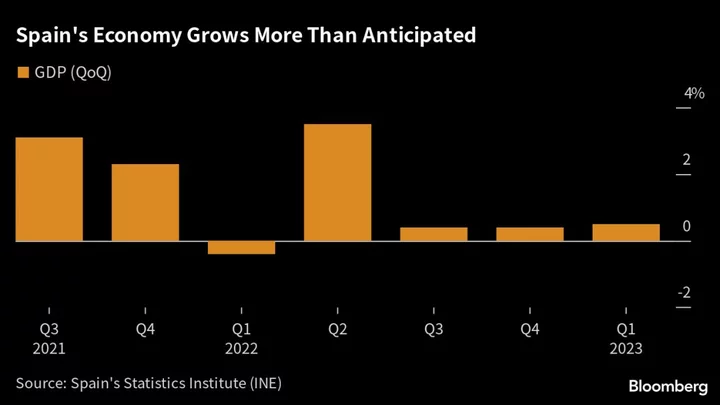Spain’s right-wing parties were poised to win two key regions in municipal elections on Sunday, potentially complicating Socialist Prime Minister Pedro Sánchez’s effort to win a new term later this year.
Alberto Núñez Feijóo’s conservative People’s Party and the far-right Vox are on a path to have absolute majorities in both Valencia and Madrid, two important bellwethers, according to tracking polls published by the state broadcaster.
Historically, the party that comes on top in the local election tends to win the national vote, which will be held in December. Sunday’s result could pave the way for the PP to return to power five years after the Socialists ousted them from government, even though Spain’s economy under Sánchez has performed better than expected.
Full results are expected later in the evening, with 12 regions up for grabs and more than 8,000 municipalities.
The Socialists have been running on Spain’s strong growth this year, which has outperformed most of its euro-area peers. Sánchez pumped billions of euros into the economy in an effort to tame inflation and to shield households and businesses from rising costs.
The Spanish government put in place windfall taxes on energy companies and banks as well as a wealth tax to help offset rising costs. Spain has also received more than 50% of the €69.6 billion ($74.6 billion) in grants allocated to it from the European Union’s pandemic-era recovery fund.
The Bank of Spain said earlier this month that it would likely boost its 2023 outlook for expansion above 2%. The resilient economy led the budget ministry to predict that Spain would be able to cut its deficit to 3% of economic output in 2024, a year ahead of target.
Markets have remained relatively quiet in the weeks ahead of the election with Spain’s 10-year bond yield up about 10 basis points since January to trade at 3.59%. The IBEX-35, which tracks Spain’s most liquid stocks, is up nearly 12% this year.
The biggest factor complicating December’s general election is the fragmentation of the political center, which has made it unlikely that a single party will be able to gain an absolute majority on its own.
Feijóo will likely have to form an alliance with the anti-migration Vox party to form a government, while Sánchez may have to rely on regional movements and smaller groups on the left such as Unidas Podemos, the current minority coalition partner.
Labor Minister Yolanda Diaz started a new party called Sumar with the intention of bringing all the far-left groups under a single banner that could help Sánchez form a government, even if he loses the general vote. So far Podemos, which has seen its support fall since the last election, has balked at joining this alliance, waiting to see the results of the regional ballot.
If this coalition were to materialize, it could thrust Diaz into the role of kingmaker for the Socialists.
(Updates with number of regions voting in fourth paragraph, addition background throughout.)









